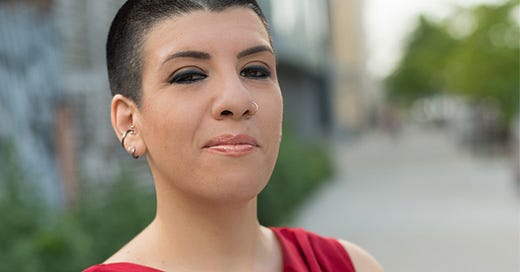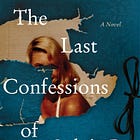Book Review: Always Too Much and Never Enough
"It is the story of hunger – for acceptance, for love, for things indefinable – and the story of finding true comfort and joy in food."
This book review was originally published in 2016 by Fempotential. I have not read the book since then nor updated this post but I think the information is still relevant and I love highlighting books that haven’t been circulating in the press for a bit. Enjoy!
Jasmin Singer is a vegan, lesbian, animal rights activist, and author whose 2016 memoir Always Too Much and Never Enough shares her story of weight gain and loss on the path to understanding the core of her own true identity. She shares raw, intimate details of her life including the journey from actor to activist, the complexity of being the much-loved but always-overweight daughter of a thin, beautiful mother, a college date rape, the death of a beloved grandmother and the many other nuances that make up a woman’s life. This is all set against the backdrop of navigating her relationship with food and with her own body in a world that makes this none too easy for any way. As her aptly titled memoir suggests, Jasmin, like many women, always feels like she is too much – too fat, too loud, too needy – and never feels like she’s enough – worthy, lovable … a situation tied up intricately with living in a time and place where there is abundance of food and so few of us are getting properly nourished.
Always Too Much begins with Jasmin’s story of weight gain, beginning from a very young age. It is the story of hunger – for acceptance, for love, for things indefinable – and the story of finding true comfort and joy in food. What is beautiful is how Jasmin ultimately as an adult doesn’t shun the idea of food as joy; but after learning more about the nutrition she elects to put into her body she celebrates it in a different way. Her journey with food is one that is always about satiating multiple forms of hunger and it’s inspiring to see that she learns to do this in healthy new ways, not shunning food or indulgence but embracing the right kind of eating as self-care. She spends a lot of her life in a cycle of overindulgence and deprivation; looking in so many places to find herself before she does. In chapter two, she writes,
“Long before I digested just how deeply food had betrayed me (and, chances are, betrayed you), I considered it a friend. And not just a friend – but a soul companion, a trusted confidant. It wooed me, then saved me. (Or so I told myself.) But then food ruined me.”
When Jasmin does ultimately lose the weight and keep it off, she faces new challenges. For so many years she was defined (by self but primarily by others) as “fat” before anything else, and becoming a smaller physical size resulted in more positive treatment from strangers in a way that was jarring to her. She shares the confusion of this, the cognitive dissonance of having the same personality in a different body and thus experiencing the world so differently. She struggles with the question of whether losing the weight is a form of internalized fat-phobia and what it means if it is. Ultimately, she accepts that we all evolve, that we are constantly changing, and that her current self is authentic to her overall world view; but it’s not something that happens overnight and it’s inspiring to read along as she grapples with this.
A large part of Jasmin’s food journey is about her food choices, not merely her weight. We learn about her decision to go vegetarian and then ultimately vegan and what unique difficulties she faced as an obese vegan. She found indulgence in non-nutritive foods that were otherwise animal-friendly, and it’s fascinating to watch her journey into food awareness as she realizes that saving all of the other animals on the planet while not caring for her own body is incongruent with her beliefs about life. She gets motivated to eat better in large part by acknowledging that caring for herself is critical to having the energy to invest in caring for others. We ultimately see Jasmin get into juicing and a whole foods plant-based diet, and we see her change through an evolving relationship with her food. There is a lot of information here about options for different ways of eating, told through the story of one woman’s experience. And she’s a woman who doubts herself a lot of the way, but she gets there, thus providing a great example. In Chapter 15, she writes:
“The fact remains that I didn’t think I could to it, but then – bam! – I did it! Everyone has something in his or her life like this. We didn’t think we could take care of a dog, drive across the country, finish college, get a master’s degree, get through that life crisis with more strength than before, run that long race, create and manage that nonprofit, write that book. Those are my examples, actually. With each of them, there were at least moments when I doubted myself. And then, step by step, I succeeded.”
Always Too Much is a great example of a memoir that shares the socio-political through the lens of the personal in a way that is highly relatable and charming enough to be continually entertaining. It is not easy to discuss the relationships women have with their bodies and the way that this relates to animal politics, food politics, feminism and other important but heavy topics. Jasmin manages to weave them all together, sharing what can be considered sometimes-radical views without alienating her audience. She doesn’t downplay her belief system but she also isn’t combative; she rightly assumes her audience to be intelligent and opinionated and shares her own story while leaving space for others to have a different point of view.
A majority of Americans today have a general idea for themselves of what “healthy eating” might mean but are often many steps removed from understanding the true nutritious value of food and how to approach eating as such. A majority of women have nuanced relationships with food and in turn with their own bodies and self-esteem and the interplay of these things. And most of us want to quiet this relationship so that we can focus on the things that truly matter to us in life, giving energy to our passions instead of to our plates. Jasmin’s story inspires smart thinking about this topic.
If you have read this far, remember that writing takes much longer than reading. Support the work by paying for it. My Sliding Scale annual rate starts at $10.








This sounds like a really interesting book and story. Thank you for sharing about it Katheryn.